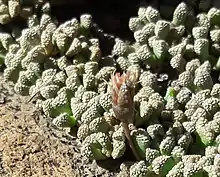Neohenricia
Neohenricia is a genus of flowering plants in the family Aizoaceae, native to South Africa.[2] Low-lying succulents, they are found in places that can collect a little water, such as crevices and pans, on sandstone or dolorite, in areas that get at least 200 mm of rainfall annually.[3]
| Neohenricia | |
|---|---|
 | |
| Neohenricia sibbettii | |
| Scientific classification | |
| Kingdom: | Plantae |
| Clade: | Tracheophytes |
| Clade: | Angiosperms |
| Clade: | Eudicots |
| Order: | Caryophyllales |
| Family: | Aizoaceae |
| Subfamily: | Ruschioideae |
| Tribe: | Ruschieae |
| Genus: | Neohenricia L.Bolus[1] |
| Species | |
|
See text | |
| Synonyms[2] | |
|
Henricia L.Bolus | |
The genus was named after Swiss-born South African plant physiologist Marguerite Gertrud Anna Henrici.[4]
Species
Currently accepted species include:[2]
- Neohenricia sibbettii (L.Bolus) L.Bolus
- Neohenricia spiculata S.A.Hammer
References
- J. S. African Bot. 4: 51 (1938)
- "Neohenricia L.Bolus". Plants of the World Online. Board of Trustees of the Royal Botanic Gardens, Kew. 2017. Retrieved 5 September 2020.
- Illustrated handbook of succulent plants. Aizoaceae. Heidrun E. K. Hartmann. Berlin: Springer. 2002. p. 186. ISBN 3-540-41691-9. OCLC 47018548.
{{cite book}}: CS1 maint: others (link) - "Henrici, Marguerite Gertrude Anna (1892-1971) on JSTOR". plants.jstor.org. Retrieved 2021-02-28.
This article is issued from Wikipedia. The text is licensed under Creative Commons - Attribution - Sharealike. Additional terms may apply for the media files.